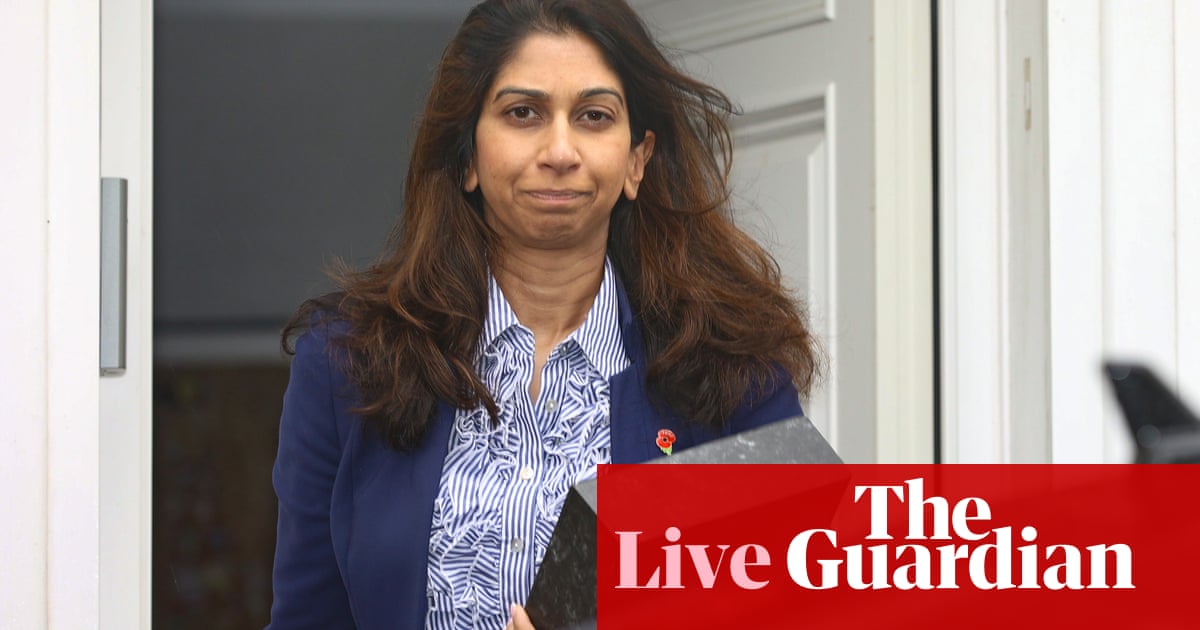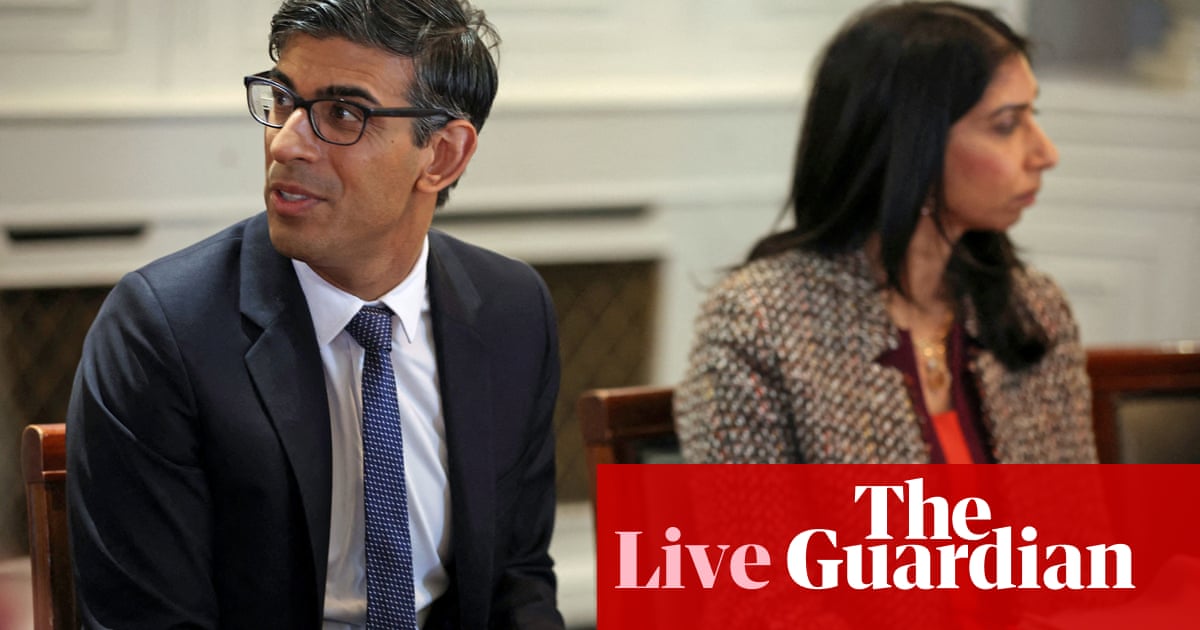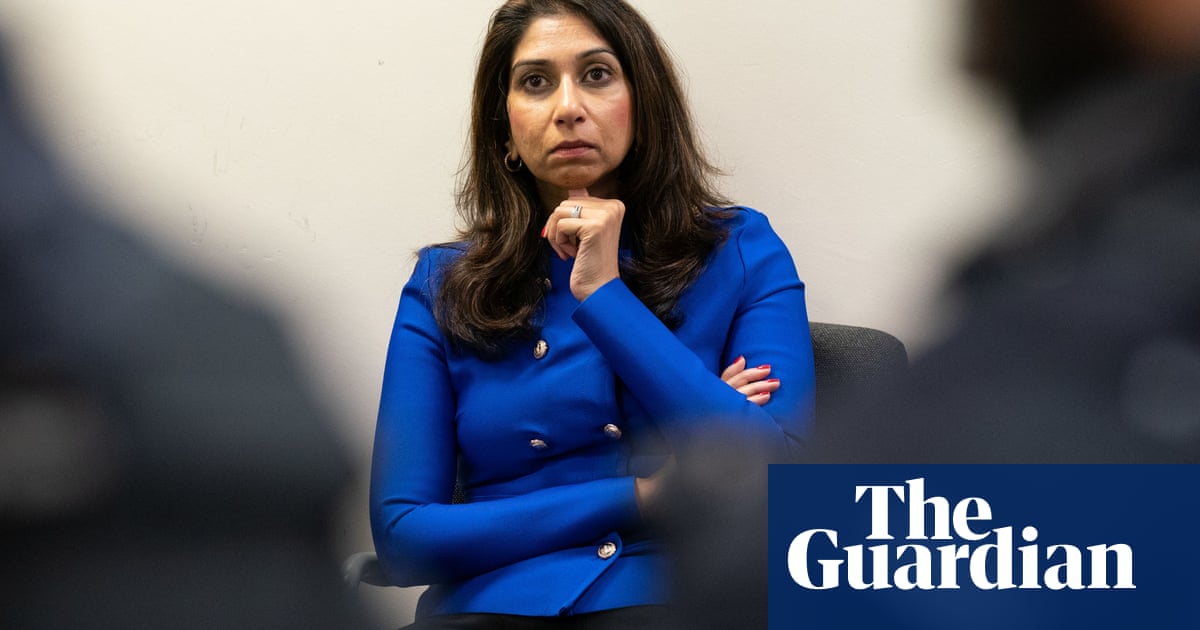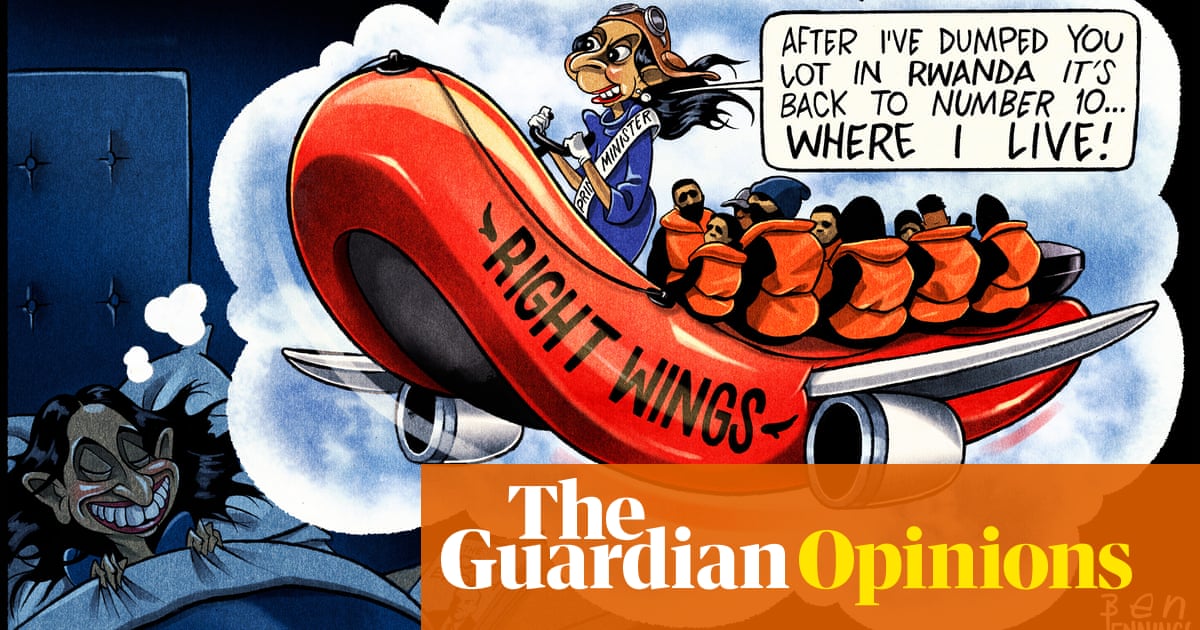
Suella Braverman"s fate remains in balance as No 10 says internal inquiry into unauthorised article still ongoing
Downing Street is still playing for time. The morning lobby briefing has just finished, and all the No 10 spokesperson would say about Suella Braverman’s fate was that the internal inquiry into what happened with her Times article is still ongoing.
The spokesperson would not even call this an “investigation”. Instead she said it was an “internal process”. That seemed to be a steer that no formal inquiry is under way into whether or not Braverman broke the ministerial code.
The spokesperson would not give any further details of what this “internal process” involves (“we are not providing running commentary”) and would not say how long it would take. But there was nothing she said that implied that a decision will come today.
Asked if the PM still had full confidence in the home secretary, the spokesperson replied: “Yes.” But this sounded more like a formality than a declaration that Sunak holds Braverman in high regard. No 10 almost always says the PM has full confidence in a minister still serving in government, and so the phrase can mean no more than that the minister in question has not yet been sacked.
Afternoon summary
Suella Braverman appears set to remain as home secretary over a weekend of remembrance ceremonies and protests, although her fate is still deeply uncertain after Jeremy Hunt joined the ministerial voices distancing themselves from her views.
The Metropolitan police has said that it will have up to 1,850 officers on duty this weekend, from the Met and other forces, to police the remembrance weekend events and the pro-Palestinian march taking place tomorrow. (See 3.30pm.)
Labour figures are urging MPs not to “undermine the party in Scotland” by supporting the SNP motion demanding a ceasefire next week, the Guardian understands.
The UK economy flatlined between July and September, compared with the previous three months, as the impact of high interest rates and inflation weighed on consumers and businesses.
The Daily Mirror splash is worth including before we wrap up. It has been praised by David Davis, the former Brexit secretary.
Met says it will have up to 1,850 officers on duty in London to police Remembrance weekend
The Metropolitan police have issued details of how they will police events in the capital on Armistice Day (tomorrow) and Remembrance Sunday. In a news release it says up to 1,850 officers from the Met and other forces will be on duty, covering the events at the Cenotaph and the march organised by the Palestine Solidarity Campaign tomorrow.
The Met says:
We know the cumulative impact [that] continued protest, increasing tensions, and rising hate crimes are having across London and the fear and anxiety our Jewish communities in particular are feeling. They have a right to feel safe in their city, knowing know they can travel across London without feeling afraid of intimidation or harassment.
Recognising the concern across London, the scale of the policing operation in place represents a doubling of the number of officers on duty for the weekend’s events. On Saturday 1,850 will be on duty and 1,375 on Sunday.
We’ll be using an extensive set of powers to prevent any disruption whatsoever to remembrance events, policing the demonstration as it passes through parts of the capital, while protecting our communities from those intent on inciting hate, violence and disorder.
The powers we’ve put in place enable us to more quickly and robustly identify and arrest those seeking to use these events to commit crime or cause disorder.
A reader asks:
If Braverman is not sacked and especially if SC rules in her favour on Wednesday, wouldn’t that mean that Sunak has conceded that he cannot challenge her and she therefore would have the whip-hand going forward. Is there any precedence for this? I cannot remember a situation where the PM is effectively less powerful than one of his own ministers.
You’re right in the sense that it would suggest that Rishi Sunak was powerless to move Suella Braverman. But you are wrong to say this would be unprecedented.
People assume that prime ministers are very powerful and can do almost whatever they want. But they are not, and all PMs have found that, once they are in office, they are constrained by a vast range of factors: what Whitehall can actually do, what the law will allow, what parliament will pass, what the media will tolerate etc etc etc.
For these purposes, the relevant factor is – what Sunak’s MPs will put up with. All three of his predecessors were forced out following a revolt by the parliamenary party, and Sunak has to work out whether he can sack Braverman without triggering a leadership contest. (I think he probably can, but it is not a certainty.)
Most prime ministers, at one point or another, find themselves in this situation. Liz Truss had to make Jeremy Hunt chancellor, and once he took office it was clear that he was running the government, not her. When Theresa May was PM, at one point cabinet ministers defied the whip on a Brexit vote, but she could not sack them because she was in too weak a position. The best example in modern times is probably Tony Blair and Gordon Brown. Towards the end of their time in office, Blair found working with Brown impossible and he considered demoting him, or getting rid of him altogether. But he couldn’t, because Brown’s standing in the party was so high.
Steve Richards is the person who has written about this best, in his book The Prime Ministers. I used the term “weak”, but Richards argues persuasively that this is misleading, because it implies PMs are constrained by a character trait, when actually it’s circumstance. Here he is on Theresa May:
May was often described as ‘weak’. The term is close to useless in casting light on a leader, but as far as it means anything, it points us in the wrong direction here. Politically she was in a much weaker position, but as a personality she remained the most stubborn prime minister to occupy No 10 for many decades – arguably more so than Margaret Thatcher.
A reader asks:
Are you aware of any poling/research which indicates whether the Tory MPs likely to survive the next election are from the extreme right or the centre right? What will the diminished parliamentary party look like and will it reflect the political orientation of its members?
I’m aware of two bits of research looking at this.
In May, in this article for the Conversation, the academics Tim Bale and David Jeffery looked at what the composition of the parliamentary Conservative party might be like under three election scenarios: a hung parliament, a Labour majority and a Labour landslide. Ideologically, the party would not change massively, but “red wall” Tories will mostly vanish in all circumstances, and even under the best outcome there will be a cull of MPs representing seats in the north. Bale and Jeffery write:
Whoever is in charge, our numbers suggest that, in the event of a heavy defeat, the Tories – represented as they would be by MPs who would be still more southern, more NIMBYish, more Oxbridge than they already are – could find it more difficult than ever to argue that they truly are a One Nation party.
And this chart, from James Blagden from Onward, a Tory thinktank, implies those MPs with big majorities (who are likely to keep their seats) are no more leftwing or rightwing than those with small majorities.
As for whether Tory MPs after the next election will share the view of Conservative party members, probably not. As this paper shows, Tory MPs tend to be more rightwing than party members on economic issues, but more liberal than members on social issues.
Tim Loughton, the Conservative MP and former minister, has told the News Agents podcast that Suella Braverman is “not making it easy” for Rishi Sunak to keep her in post. Asked if Braverman’s position was now untenable, he replied:
She’s not making it easy, I have to say. And this needs to come to a head, it’s doing quite a lot of damage. We cannot have senior members of the cabinet, on the face of it, defying No 10 and plying her own agenda. And some of the comments she has made have been unhelpful. And many of us are getting emails from constituents to that effect as well, so it needs to stop.
Loughton said he thought Braverman was wrong to describe the pro-Palestinian demonstrations as “hate marches” because, he said, “whether or not we agree with most of those people there, I think most of those people have genuine concerns”. He also said that her anti-police comments had undermined the credibility of the police, which would make it harder for them to police the march on Saturday.
Asked what the consensus view was among Tory MPs, Loughton said:
The consensus opinion is one of exasperation, that we have got a huge challenge. We are in a very perilous position in the polls, we’ve had some bad byelections, and an election is probably less than a year away now. The way you lose elections is to be divided and constantly internally looking and internally fighting. The public hates that and doesn’t want to see that. And so, when you have particular individuals, high-profile individuals, ministers and others, who appear to be singing from a different song sheet, that is really not helpful.
A reader asks:
If Suella Braverman resigns, what effect do you think that will have on Sunak’s government? Will it look hypocritical to sack her (if he does it on the basis of the ministerial code), having re-hired her after breaking it?
If Rishi Sunak does sack Suella Braverman, Labour and others may argue that this shows he was wrong to appoint her in the first place. But that is not the sort of argument that will shift the way Sunak is perceived. Generally, when politicians reverse a bad decision, as long as the new decision is better than the old one, they tend to get some credit for doing what people want.
Braverman is not popular with voters, and so it is hard to see what the government will miss if Sunak gets rid of her. While her views might be popular with core Tory voters, she has not managed to persuade the public that the government is tackling small boats, or crime, effectively. There is no real evidence she has been an asset electorally.
But in party management terms, the argument is different. Some rightwing Tory MPs, and papers, are very supportive, and it is possible or likely they would react very angrily if Braverman were to be sacked. This could provide Sunak with an opportunity if he can show voters that is is able and willing to face down rebels in his party. But if he can’t, and if the party were to descend into civil war, then getting rid of her could cause even more trouble.
A reader asks:
Do you think Suella Braverman should be classed as an extreme right wing politician ? She has the same views as Marine Le Pen on most subjects (so it isnt simply right wing “populism”. Why is the British Establishment so afraid to [identify] right wing extremism in its politicians?
Yes, to some extent I do. I made that argument here on the blog, in a snap analysis after Braverman’s speech to the party conference. I made a similar point yesterday.
Some caution is undertandable. For many journalists and readers/viewers, the terms far/hard/extreme right/left do not have precise definitions, and so using them in reports might not contribute to understanding. Instead it could just look like adding a ‘this person’s a baddie’ label, which is not conducive to good reporting.
But politicial scientists do use these terms in meaningful ways. In my blog post after the Tory conference I mentioned a Guardian story about far-right parties in Europe in which the academics were quoted as saying they had thought hard about whether or not the Conservative party should be categorised as far-right.
One of the academics who has studied this most closely is Cas Mudde and in his book The Far Right Today he argues that the far right divides into two categories: the extreme right which “rejects the essence of democracy, that is, popular sovereignty and majority rule”; and the radical right, which “accepts the essence of democracy, but opposes fundamental elements of liberal democracy, most notably minority rights, rule of law and separtion of powers”.
Using these definitions, Braverman is obviously not “extreme right”. But, given the contempt she has repeatedly shown for certain liberal democratic norms, there is a strong case for saying her politics put her in “radical right” territory.
Partly that is to do with attitude to the rule of law. It is perfectly possible to argue for withdrawal from the European convention on human rights without being far right/left. But, as attorney general and home secretary, Braverman has been contemptuous of lawyers, and much more enthusiastic about testing how far the limits of the law (particularly international law) can be pushed than her predecessors. Her comments about migrants have appalled people concerned about minority rights. And, on separation of powers, the current row about the Met shows her wanting to extend the powers of the executive, at least in relation to policing, further than they’ve gone before.
That doesn’t mean she’s Donald Trump, or 100% far right. But she is definitely heading in that direction.
Who might replace Braverman as home secretary?
A reader asks:
If Braverman is sacked who is likely to replace her?
The Times this morning is tipping Oliver Dowden. In its main write-through it says:
Oliver Dowden was in No 10 on Thursday to discuss Braverman’s future. He is being tipped as a “safe pair of hands” who could replace Braverman and be a more “loyal” home secretary. He would remain deputy prime minister if he was given the role.
Other names being suggested are Mark Harper, the transport secretary, and Robert Jenrick, the immigration minister, although one minister pointed out that any three of those people would leave the top four offices of state without a woman.
Sir Bob Neill, chair of the Commons justice committee, told LBC’s Tonight with Andrew Marr yesterday that Braverman should go and that Jenrick should get the job instead. Neill said:
[Braverman] has a very able minister of state in Robert Jenrick. He is well capable of taking up the matters in the short term.
Another suggestion is Michael Gove, the levelling up secretary. He has been in cabinet level jobs for more than a decade (with a gap, after he was sacked by Theresa May), but he has never held one of the “great offices of state” (PM, chancellor, home secretary, foreign secretary), and it is said he would like to add one to his CV. This is from HuffPost’s Kevin Schofield.
Here is some more from what was said at the No 10 lobby briefing this morning about Suella Braverman.
The No 10 spokesperson would not say whether Rishi Sunak and Braverman have spoken within the past 24 hours.
The spokesperson said the government was working closely with the police and others “to ensure that Remembrance events this weekend are protected from disruption and that people, veterans and those gathering to mark Remembrance feel safe and similarly that those in the Jewish community and indeed Muslim communities do not face intimidation or harassment”.
The spokesperson claimed that Sunak and Braverman work closely together. In an interview this morning Jeremy Hunt, the chancellor, said he had a “productive relationship” with Braverman. Asked if the Sunak/Braverman relationship was also productive, the spokespeson replied:
Yes, they work very closely as they have been on protests and preparations for the weekend, tackling small boats and on the legislation set out in the king’s speech to make our streets safer.
Stewart Jackson, the prominent Brexiter and former MP who is now a Tory peer, has issued a statement supporting Suella Braverman. He implies rightwingers in the party will get their revenge on ministers who have not defended her.
To my friends in the Cabinet. Your silence and refusal to support Suella Braverman is being noticed by the electorate, within @conservatives and beyond. Difficult times require honesty, integrity, leadership and candour.
Suella Braverman"s fate remains in balance as No 10 says internal inquiry into unauthorised article still ongoing
Downing Street is still playing for time. The morning lobby briefing has just finished, and all the No 10 spokesperson would say about Suella Braverman’s fate was that the internal inquiry into what happened with her Times article is still ongoing.
The spokesperson would not even call this an “investigation”. Instead she said it was an “internal process”. That seemed to be a steer that no formal inquiry is under way into whether or not Braverman broke the ministerial code.
The spokesperson would not give any further details of what this “internal process” involves (“we are not providing running commentary”) and would not say how long it would take. But there was nothing she said that implied that a decision will come today.
Asked if the PM still had full confidence in the home secretary, the spokesperson replied: “Yes.” But this sounded more like a formality than a declaration that Sunak holds Braverman in high regard. No 10 almost always says the PM has full confidence in a minister still serving in government, and so the phrase can mean no more than that the minister in question has not yet been sacked.
Gavin Barwell, who was Theresa May’s chief of staff and how is now a Tory peer, told Times Radio this morning that he thought Suella Braverman would be sacked. He explained:
She’s also making the job of all of her colleagues trying to get re-elected in a year’s time more difficult. She is personally on a mission, as far as I can see, to re-toxify the Conservative brand.
And it’s not so much the issues that she talks about. If you take the example, before this latest article … about the demonstrations, when she talked about people living on the streets being a lifestyle choice.
Now, I expect that many of your listeners would agree with her that we don’t want tent cities on our streets and we have a concern about aggressive begging. But nobody that I know thinks that the people that are on our streets are there because they want to be there. Most of them have got highly complex problems. Not just a housing problem, but mental health and addiction issues. And they deserve our sympathy and our support and government intervention to try and help get them off the streets, not labelling them as people that are somehow choosing to behave in this way.
So all of these interventions she makes are making Rishi Sunak’s job, and the job of every single Conservative candidate elected at the next election, more difficult.
So for both those reasons, if you’re a Conservative, she’s not helping. And more importantly, for those of your listeners that aren’t Conservatives, she’s making the job of the police at this most difficult time, even harder.
What Tory papers are saying about Braverman
The Daily Mail’s editorial this morning makes for much happier reading for Suella Braverman than the Telegraph’s (see 11.25am). It says Rishi Sunak should not sack her.
Mrs Braverman simply articulated what every dog on the street already knew: that infected by wokery, our police forces have increasingly abandoned the neutrality they once jealously guarded …
The reason Mrs Braverman has provoked such wild opposition is that she is criticising a shibboleth of many of our institutions – that of toxic identity politics.
Scenting blood, the Home Secretary’s enemies have urged Rishi Sunak to sack her. That would be harsh on a politician who has simply injected common sense into the policing debate. He should resist.
But the Sun is a bit more critical. In its editoral, it says that Braverman was right about the police – but that in going public with her views the home secretary has ignited a row that has helped Labour. It says:
There is a suspicion they no longer police “without fear or favour”. That they go easier on more fashionable causes.
But pointing that out is the job of campaigners and commentators, not Home Secretary Suella Braverman.
She is in charge. She has the power to read police chiefs the riot act. Instead she hit out in The Times, giving the impression she has no control of events.
That, plus the squabble it has ignited with No10, have been a gift for Labour and its broadcast media friends.
They are now able to sideline their party’s own deep splits over Gaza...
And pretend Ms Braverman’s bluntness is the cause of our unrest, not the terrifying anti-Semitism spewing from the Left.
This is an echo of the “Connie the commentator” critique made by George Osborne yesterday. (See 10.06am.)
Suella Braverman may have been happy with the Daily Mail splash this morning (see 9.08am), but she won’t be so happy with the Daily Telegraph’s editorial. It says many people will agree with her claim that the police have been soft on pro-Palestinian demonstrations. But it goes on:
But Mrs Braverman holds one of the great offices of state and occupies a complex position in the constitutional settlement. Hers is obviously a political role, given that she is an MP and a member of the Cabinet, but it includes certain statutory responsibilities and functions.
Her newspaper article effectively criticising Sir Mark Rowley, the Metropolitan Police Commissioner, for not requesting a ban on Saturday’s pro-Palestine march, cut across operational decisions which have always been off-limits to politicians for good reason.
We do not want to live in a country in which ministers can direct officers to arrest particular individuals, or involve themselves directly in police decisions. If Mrs Braverman had wanted Saturday’s march proscribed, she could have brought forward an emergency Bill to do so.












